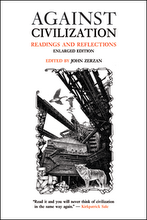WOMAN AND NATURE: THE ROARING INSIDE HER (1978)
SUSAN GRIFFIN
SUSAN GRIFFIN
He says that woman speaks with nature. That she hears voices from under the earth. That wind blows in her ears and trees whisper to her. That the dead sing through her mouth and the cries of infants are clear to her. But for him this dialogue is over. He says he is not part of this world, that he was set on this world as a stranger. He sets himself apart from woman and nature.
And so it is Goldilocks who goes to the home of the three bears, Little Red Riding Hood who converses with the wolf, Dorothy who befriends a lion, Snow White who talks to the birds, Cinderella with mice as her allies, the Mermaid who is half fish, Thumbelina courted by a mole. (And when we hear in the Navaho chant of the mountain that a grown man sits and smokes with bears and follows directions given to him by squirrels, we are surprised. We had thought only little girls spoke with animals.)
We are the bird’s eggs. Bird’s eggs, flowers, butterflies, rabbits, cows, sheep; we are caterpillars; we are leaves of ivy and sprigs of wallflower. We are women. We rise from the wave. We are gazelle and doe, elephant and whale, lilies and roses and peach, we are air, we are flame, we are oyster and pearl, we are girls. We are woman and nature. And he says he cannot hear us speak.
But we hear.
Aktualizácia prekladu (19.08.2010)
ŽENA A PRÍRODA: BÚRKA V JEJ VNÚTRI (1978)
SUSAN GRIFFIN
SUSAN GRIFFIN
On hovorí, že žena sa rozpráva s prírodou. Že počuje hlasy spod zeme. Že vietor jej veje v ušiach a stromy jej šepkajú. Že mŕtvi spievajú jej ústami a že rozumie plaču detí. Ale pre neho tento dialóg skončil. Hovorí, že on nie je súčasťou tohto sveta, že bol umiestnený do tohto sveta ako cudzinec. Vyčleňuje sa od ženy a prírody.
A tak je to Zlatovláska, ktorá príde k chatke troch medveďov, Malá červená čiapočka, ktorá sa rozpráva s vlkom, Dorotka, ktorá sa spriatelí s levom, Snežienka, ktorá rozpráva s vtákmi, Popoluška so svojimi kamarátkami myškami, Malá morská víla, ktorá je napoly rybou, Palculienka, o ktorú sa uchádza krtko. (A keď počujeme ľudí z kmeňa Navaho spievať o hore, na ktorej sedí dospelý muž, pofajčieva s medveďmi a nasleduje cestu, ktorou ho nasmerujú veveričky, sme prekvapení. My sme si mysleli, že len malé dievčatká rozprávajú so zvieratami.)
My sme vajíčka vtákov. Vajíčka vtákov, kvety, motýle, zajace, kravy, ovce; my sme húsenice; sme listy brečtanu a vetvičky horčičníka. Sme ženy. Stúpame z vĺn. Sme gazely a lane, slonice a veľryby, ľalie a ruže a broskyne, sme vzduch, sme plameň, sme ustrice a perly, sme dievčatá. Sme ženy a príroda. A on hovorí, že nás nepočuje rozprávať.
Ale my počujeme.







1 comments:
Ahoj, já teď právě tuto knihu dočítám, také mě velmi oslovila, a dostala jsem stejný nápad jako ty - založit blog. Jak pokračuje tvá práce, život? Máš nějaké reakce na tuto knihu? Změnil jsi způsob života, oslovil nějaké lidi?
Zdravím Tě srdečně,
Romana
Post a Comment